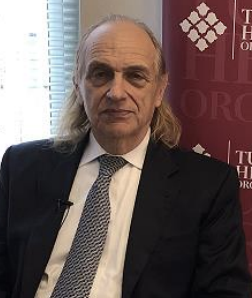Going Dark: Implications of an Encrypted World

“Going Dark: Implications of an Encrypted World“
Speakers: Wagner, A. (Center for Advanced Studies on Terrorism); D’Antoine, S. (Margin Research)
Date: 23 July 2019
Speaker Session Preview
SMA hosted a speaker session presented by Dr. Abraham Wagner (Center for Advanced Studies on Terrorism) and Ms. Sophia D’Antoine (Margin Research) as a part of its SMA DHS Speaker Series. Dr. Wagner set the context for the talk by reminding listeners that in the mid-1990s, the world was in a period of transition from analog to digital and that today, we live in a connected world that adapts to demand. In modern society, encryption is needed for privacy and security purposes; however, it also presents a challenge for law enforcement. The Internet’s user base has greatly expanded; however, this population has also become far more computer literate and savvy, which adds to the difficulty of law enforcement. Dr. Wagner also explained that in solving the cybersecurity problem, low-cost technical solutions should be implemented that have marginal to zero cost to users. He stated that devices from the “Old World,” such as Enigma, were so costly to assemble and difficult to use that ultimately, consumers did not want to purchase them. Dr. Wagner then presented Wagner’s law, which states that users will avoid encryption if it is costly, inconvenient, and/or degrades quality. He also mentioned that control of encryption is largely beyond US governmental control today. Ms. Sophia D’Antoine then offered a tech perspective on the issues surrounding encryption. Currently, technologists have two means for bypassing encryption: either obtaining the key for the system or using alternative means (i.e., acquiring the data before or after it is encrypted). Research is currently being conducted on how to bypass encryption protecting telegram messages sent via smartphones, in addition to different encryption algorithms that look for holes in a system to break encryption codes and/or bypass them. She concluded by discussing the problem of mass data collection and the inability to pinpoint a specific user or device. In the future, this will only become more difficult, and exploitation will become more prevalent, Ms. D’Antoine stressed.

Dr. Abraham Wagner
Dr. Abraham Wagner currently teaches in the areas of national security and intelligence atColumbia Law School and UCLA. He is also a Senior Research Fellow at the Center for AdvancedStudies on Terrorism. Prior to joining Columbia in 2005 he served in several U.S. governmentpositions, including the National Security Council Staff, the Office of the Director of CentralIntelligence and the Department of Defense. In 2016-2017 he was a member of the Trump-Pencetransition team chairing the group on cybersecurity policy. He also lectures on national securityand counter-terrorism issues, appearing on Fox News and other media, and is a frequentcontributor to the Washington Times. Dr. Wagner writes and consults on national security issues,with a focus on technical issues, such as the evolving threat from cyberterrorism and issuesrelated to electronic surveillance. He also serves as a consultant to several U.S. Governmentagencies.
His publications include Henry Kissinger: Pragmatic Stateman in Hostile Times (2019),Cybersecurity and Cyberlaw (2019); Domestic Intelligence: Needs and Strategies (2009); Terrorismand Surveillance: The Technical and Legal Context (2007); Terrorism, Global Security and the Law(2007); Meeting the Terrorist Challenge: Coping with Failures of Leadership and Intelligence(2007); Cyber-Terrorism: Evolution and Trends (2004); a four-volume series (with AnthonyCordesman) Lessons of Modern War (Volume 1: The Middle East, Volume 2: The Falklands andAfghanistan, Volume 3: The Iran-Iraq War; and Volume 4: The Golf War). Dr. Wagner received hisA.B., MA, Ph.D., and JD degrees from Harvard University.
Sophia D’Antoine
Sophia is the found of Margin Research, a boutique security research firm based in New York City and the Hacker in Residence at NYU. Previously she has served at the NSA as well as a commercial security company. She is an alumnus of RPI where she taught Modern Binary Exploitation and helped run RPISEC, the university hacking team.
Her current work focuses on finding novel solutions to unique security problems, software vulnerabilities, and information operations. She also provides a technical voice of reason when advising for policy groups, NYU Law’s Cyber program, and large firms looking to price security risk.
She has co-authored policy papers on topics in offensive cyber including an Executive Order and a Lawfare article on the risks associated with Huawei 5G (https://www.lawfareblog.com/risks-huawei-risk-mitigation).
A mostly complete listing of conference talks and publications: https://www.sophia.re/#pcs
